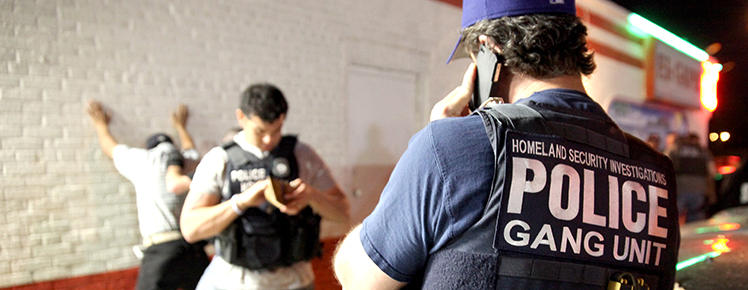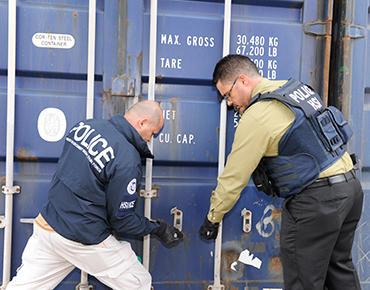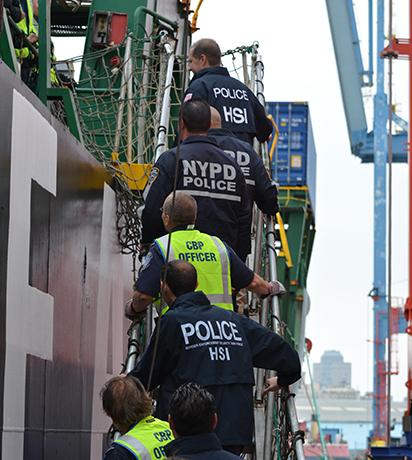HSI – A Diverse, Global Force
HSI is a critical investigative arm of the Department of Homeland Security and is a vital U.S. asset in combating criminal organizations illegally exploiting America's travel, trade, financial and immigration systems.
HSI’s workforce includes special agents, analysts, auditors and support staff. Its men and women are assigned to cities throughout the United States and to offices around the world. HSI’s international force is the department’s largest investigative presence abroad and gives HSI one of the largest international footprints in U.S. law enforcement.
HSI has broad legal authority to enforce a diverse array of federal statutes. It uses this authority to investigate all types of cross-border criminal activity, including:
- Financial crimes, money laundering and bulk cash smuggling;
- Commercial fraud and intellectual property theft;
- Cybercrimes;
- Human rights violations;
- Human smuggling and trafficking;
- Immigration, document and benefit fraud;
- Narcotics and weapons smuggling/trafficking;
- Transnational gang activity;
- Export enforcement; and,
- International art and antiquity theft.
The threats presented by criminals in these areas have far-reaching consequences. In response, HSI uses a versatile approach to conducting its operations so that it can achieve the best results for the nation and its people.
Forging a New Legacy
When Homeland Security Investigations was formed, ICE's goal was to combat criminal threats facing the United States with a law enforcement force that would be recognized worldwide for its expertise and effectiveness.
Years later, HSI can lay claim to achieving this ambitious goal. HSI's successes in combating terrorism and enhancing national security have resonated throughout the global law enforcement community, private industry and general public.
In HSI's first full year in existence, its criminal investigations increased in nearly every area to ICE's prior three-year average. Criminal arrests rose by almost 30 percent; indictments by nearly 18 percent; search warrants by almost 60 percent; seizures of illicit drugs by more than 40 percent; intellectual property rights seizures by 128 percent; and weapons and ammunition seizures by a staggering 762 percent. This standard of excellence has continued ever since, with HSI's dedicated workforce affecting global change and disrupting and dismantling criminal organizations.
Today, HSI carries out its mission in an increasingly complex world that poses immense technical challenges to America's homeland security. The task is daunting, but HSI has risen to the challenge with intelligence, flexibility and commitment to excellence. Indeed, HSI has proven that it will continue to achieve the goal that has become its motto – to forge a new legacy of honor, service and integrity.

Derek N. Benner
Acting Executive Associate Director, Homeland Security Investigations
Derek N. Benner is currently the Acting Executive Associate Director for Homeland Security Investigations (HSI), an organization of more than 9,000 employees, which includes more than 6,000 special agents who are assigned to 26 Special Agent in Charge offices in major cities, 185 other field offices throughout the United States, and 67 overseas locations in 50 countries. Prior to this assignment, Mr. Benner served as the Deputy Executive Associate Director for HSI. As the investigative component of U.S. Immigration and Customs Enforcement (ICE), HSI’s investigative and enforcement initiatives and operations target cross-border criminal organizations that exploit America's legitimate trade, travel, financial and immigration systems for their illicit purposes.
Prior to this position, Mr. Benner served as the Assistant Director of Domestic Operations with oversight of HSI’s 26 domestic field offices. Mr. Benner also served as Special Agent in Charge for HSI in San Diego, California. In this position, he oversaw one HSI’s largest investigative offices in the nation, which includes a diverse cadre of federal agents, intelligence analysts, and professional administrative staff at throughout San Diego and Imperial counties. He also oversaw a number of HSI-led multiagency tasks forces, which include state, local and federal law enforcement members working together to target cross-border criminal organizations that exploit the legitimate commercial trade, travel, and financial systems in the California/Mexico border region.
Prior to this assignment, Mr. Benner served in several key leadership positions at ICE headquarters. As the deputy assistant director of HSI’s Financial, Narcotics and Special Operations Division in Washington, D.C., he was responsible for the agencies national financial fraud and narcotics smuggling programs. He also served as chief of staff to the director of HSI and provided management oversight at the national level.
Mr. Benner began his law enforcement career with the U.S. Customs Service in 1991 as a co-op student. He worked at the San Ysidro Port of Entry as a customs inspector for two years before becoming a marine enforcement officer and a special agent with the U.S. Customs Service’s Office of Investigations in San Diego. In 2002, Benner was promoted to the management ranks where he supervised agents assigned to the local maritime smuggling task force and managed the asset forfeiture, intelligence and administration programs as an assistant special agent in charge in San Diego.
Mr. Benner holds a Bachelor of Arts degree in political science from George Mason University.
HSI Divisions
To accomplish its mission, HSI is organized into the following divisions:
- Domestic Operations oversees all investigative activities of HSI’s domestic field offices (read more)
- HSI-led National Intellectual Property Rights Coordination Center conducts investigations related to intellectual property theft. It also combats trade practices that threaten the global economy (read more)
- Information Management oversees initiatives that combine information sharing and technology across the Department of Homeland Security. It also oversees technical and business-related activities carried out by HSI (read more)
- International Operations oversees HSI attaché offices and builds relationships with foreign law enforcement partners (read more)
- Investigative Programs conducts operations in areas including cybercrime, financial and narcotics violations, transnational crime and public safety. It also supports law enforcement partners through training, technical assistance, computer forensic analysis and forensic services (read more)
- Mission Support provides budgetary and financial services to all of HSI. It also provides information technology, human capital and record management support (read more)
- National Security Investigations investigates vulnerabilities in the nation’s borders. It also works to prevents acts of terrorism (read more)
- Office of Intelligence conducts broad intelligence operations. It also develops data for use by ICE, the Department of Homeland Security and other law enforcement partners (read more)
Together, these divisions enable HSI to enforce our nation’s laws and protect its people from those seeking to do them harm.
HSI Field Offices
HSI has 26 field offices throughout the United States.
HSI – Historic Origins
Homeland Security Investigations' (HSI) story begins in 1789 when Congress established the U.S. Customs Service and in 1891 with the creation of the Office of the Superintendent of Immigration under the Treasury Department.
Customs houses were used as administrative headquarters at ports of entry around the country. Customs officials inspected, taxed, stamped and released imported goods. The agency also stopped banned items from entering the country. Officials used ships, called cutters, to stop ships bearing cargo at sea and to prevent smugglers from bringing items ashore. The list of barred items changed over time, but included undeclared liquor, tobacco, firearms, drugs, stolen property and certain foods. The 1976 Arms Export Control Act gave Customs the additional authority to investigate and prevent international weapons trafficking.
The Immigration Act of 1891 made immigration a federal function. Immigration inspectors at various ports of entry inspected passenger manifests, conducted health inspections and accepted or rejected immigrants. In 1906, Congress passed the Basic Naturalization Act, which framed the rules for naturalization within the United States. The law established standard naturalization forms and encouraged state and local courts to relinquish their naturalization jurisdiction to federal courts.
In 1933, Congress established the U.S. Immigration and Naturalization Service (INS). The Immigration Reform and Control Act of 1986 expanded INS’ responsibilities by allowing it to investigative certain gang, fraud and human smuggling activities, and enforce sanctions against employers who hired undocumented aliens. Additionally, the Illegal Immigration Reform and Immigrant Responsibility Act of 1996 enabled the hiring of additional INS special agents for interior enforcement and bolstered certain criminal penalties, including those for alien smuggling.
On Sept. 11, 2001 terrorists on board American Airlines Flight 11 intentionally crashed the plane into the World Trade Center's North Tower. The tower was home to the U.S. Customs House at 6 World Trade Center.
After the events of 9/11, the government created a stronger approach to national security with the passage of the Homeland Security Act and the creation of the Department of Homeland Security. The department was formed by combining 22 different federal organizations into a unified force.
In 2003, Customs and INS were merged into the department’s U.S. Immigration and Customs Enforcement (ICE). In 2010, HSI was formed within ICE from elements of ICE’s previous Offices of Investigations, Intelligence and International Affairs.


















